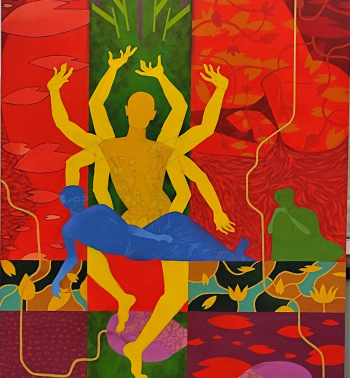1 October 2024
Artist Amrut Sawant paints the health journey of a man who recovered from prostate cancer as a result of a robotic operation performed by Prof Prokar Dasgupta OBE. This artwork is a part of the Rang De Neela initiative. In this blog Dr Ami Shah, founder of the Rang De Neela initiative, explains the story behind the painting.
Rang De Neela is an initiative that aims to increase health awareness in India and across the world by combining art and healthcare. The Rang De Neela healing journey project showcases stories of resilience, by blending of health and art to inspire others. One of these stories is Mr Krishna Wankhede's, whose prostate cancer battle and recovery was depicted in Amrut Sawant’s painting titled नवारंभ: अन्यारंभस्यांतादायाति. At the heart of Mr Wankhede's story was Prof Prokar Dasgupta OBE, a globally renowned surgeon and pioneer in robotic surgery, who played a pivotal role in Mr Wankhede’s treatment using the da vinci surgical system.
Mr Wankhede's story
Mr Wankhede’s journey began in 2022 when he was diagnosed with prostate cancer after managing prostate enlargement since 2016. Prostate cancer often develops silently, with many not experiencing symptoms for years, but it can become life-threatening if not treated promptly.
As the disease progressed, Mr Wankhede's family rallied around him, with his brother, Dr Ravi Wankhede - an anaesthetist at Apollo Gleneagles - playing a crucial role in planning his treatment. Dr Amit Ghose, a leading urologist in Kolkata, India, invited Prof Dasgupta to perform the surgery using the state-of-the-art da vinci robotic surgical system. Prof Dasgupta has been associated with Apollo Gleneagles for more than 12 years as the honorary director of their robotic program.
Blending medicine and art
In the Rang De Neela artwork, artist Amrut Sawant portrays Mr Wankhede in red, with murky water flowing over his lower body to symbolise the burden of cancer. Yet his heart and mind shine with positivity, as represented by lotus flowers signifying rebirth, purity, resilience, and strength. Sawant captured the pivotal roles of each doctor in Mr Wankhede’s recovery, depicting Prof Prokar Dasgupta as a modern-day Narsimha, the fierce protector, wielding the da vinci robot to battle cancer.
The blue man symbolising Mr Wankhede's freedom from cancer, is cradled by the part-man-part-robot — a fictional incarnation of the divine. The robotic system not only enhances surgical precision but also aids in faster recovery through smaller incisions and minimized blood loss. Sawant integrates two large lotus flowers as metaphors for lifelines — one representing Dr Ravi Wankhede, who orchestrated the treatment, and the other symbolising Dr Amit Ghose, whose expertise and collaboration were essential to the success of the surgery.
Mr Wankhede’s daughter, Neha, is portrayed standing by his side, a symbol of familial strength during his health crisis. The painting weaves together human expertise, technology, and faith, reminding us of the profound impact that collaboration between healthcare professionals can have on patients’ lives.
Prof Dasgupta, Professor of Surgery at King's Health Partners Academic Surgery, said:
Prostate-Specific Antigen (PSA) levels tend to rise in elderly men, and while elevated levels are not always indicative of cancer, they do require close monitoring… Early detection of prostate issues, whether benign enlargement or malignancy, is crucial for effective treatment. We encourage men over 50 to undergo regular PSA screenings to identify potential problems before they escalate.
Dr Rajiv Kovil, Head of Diabetology at Zandra Healthcare and co-founder of the Rang De Neela Initiative, said:
Prof Dasgupta is a British-Indian surgeon and academic, renowned for his pioneering work in robotic surgery - including one of the early keyhole procedures in Britain using the da vinci robot in 2005. His expertise in merging 3D-printed replicas with surgical precision played a critical role in saving Mr Wankhede’s life during his complex prostate surgery.
Dr Ami Shah, co-founder of Zandra Healthcare and the Rang De Neela Initiative, said:
Prof Dasgupta described the surgery as a ‘trans-world experience,’ where he had the unique opportunity to operate in India, his birthplace, and contribute his expertise. The collaboration between Dr Ghose’s team in India and Prof Dasgupta’s team in the United Kingdom facilitated the implementation of international protocols for Indian patients. This surgery not only saved Mr Wankhede’s life but also served as a valuable learning experience for the local medical team, advancing their understanding of robotic surgery.





